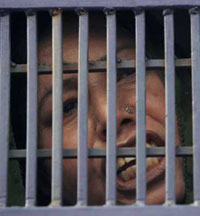Pakistan releases imprisoned opposition supporters
Some of the opposition supporters, who were imprisoned when the state of emergency was declared in Pakistan, have been released, Pakistan authorities say.

The releases came hours after judges hand-picked by President Gen. Pervez Musharraf quashed legal challenges to his disputed re-election as president. The decision enraged his most bitter opponents, but others said it could lead to an easing of restrictions and make it easier for politicians to campaign for Jan. 8 parliamentary elections.
Most of the few hundred people set free overnight were lawyers and ordinary opposition supporters. Many high-ranking party activists and leaders, such as former cricket star Imran Khan, remained in prison. Khan began a hunger strike Monday to protest emergency rule.
In the southern province of Sindh, authorities released 300 people, including lawyers, human rights activists and supporters of former Prime Minister Benazir Bhutto, one of Musharraf's chief rivals.
"All the political workers and lawyers who were detained ... are being released," said a senior provincial official, Ghulam Mohammed Mohtarem. "We had instructions from the chief minister to release these people."
He added that others - he wouldn't say how many - remain in jail, including 11 people charged with sedition since emergency rule was imposed on Nov. 3.
In neighboring Baluchistan, 49 lawyers and six political activists were set free, said Rehmatullah Niazi, a senior police officer in Quetta, the provincial capital. Three other lawyers remain in custody.
Thousands of other people also remain imprisoned in Pakistan's other two provinces.
Musharraf says the emergency is needed to combat increasingly powerful Islamic militants. But his government has used emergency rule to jail his political opponents, purge Supreme Court judges and muffle independent TV stations.
Critics say he imposed the emergency solely to preserve his grip on power by preventing the then-Supreme Court from invalidating his recent re-election as president.
When the reconstituted Supreme Court threw out legal challenges to Musharraf's re-election Monday, critics denounced the decision as illegitimate and insisted that Musharraf relinquish power to end the country's political turmoil.
However, the ruling did pave the way for Musharraf to fulfill a promise to quit as army chief and rule as a civilian president, perhaps by the end of the month, and some opposition leaders and analysts said the ruling could prompt the government to ease the emergency.
"The whole country was subject to martial law only to get this decision," said Ahsan Iqbal, leader of one of Pakistan 's two main opposition parties. "Now he has got his decision at gunpoint" and may soon make concessions, Iqbal said.
Musharraf headed to Saudi Arabia on Tuesday for talks with King Abdullah about the political crisis, said the president's spokesman, Rashid Qureshi. Musharraf frequently visits Saudi Arabia, a close ally that is also home to one of his staunchest opponents - former prime minister Nawaz Sharif, who the general toppled in a bloodless 1999 coup.
The two have no plans to meet, Sharif was quoted as saying by Pakistan 's Dawn newspaper on Tuesday.
The administration of U.S. President George W. Bush has put intense pressure on Musharraf to lift emergency rule as swiftly as possible, saying that the elections cannot be fair unless Musharraf frees opponents, lifts media curbs and lets candidates campaign freely.
It also has urged opposition parties to restart a dialogue of reconciliation with the government that last month yielded an amnesty for Bhutto from corruption charges, allowing her to return from exile.
Bhutto, a former prime minister who also favors ties with the U.S., said on Monday that she had no plans to revive power-sharing negotiations with Musharraf. The talks broke down after police put her under house arrest to stop her from leading rallies against the general's suspension of the constitution.
However, she didn't repeat a vow made last week not to work with Musharraf after the vote.
Subscribe to Pravda.Ru Telegram channel, Facebook, RSS!





